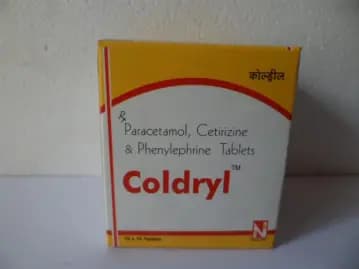Coldryl Tablets: Benefits, Uses, Side Effects And More
Coldryl tablets are a prescription medicine used to treat cold symptoms, with the active ingredients cetirizine (5mg), paracetamol (500mg) and phenylephrine (5mg).
Usually, this drug is used in case of the following ailments:
- Runny nose
- Nasal congestion
- Sneezing
- Watering and congestion in the eyes
There are three active components in the drug, these components are listed below:
- Cetirizine (5mg)
- Paracetamol (500mg)
- Phenylephrine (5mg)
If we learn about the active ingredients listed above, we can learn about the risks, side effects and benefits of the drug.

What Will We Learn?
What Is Paracetamol?
Paracetamol is a common and generally safe ingredient used by many different brands of cold medicine.
Paracetamol is a pain reliever and is used to treat pain.
It may cause drowsiness in some people.
Everyone, including pregnant women, can use this component in the right doses by talking to the doctor.
This ingredient can be taken on an empty or full stomach.
4 doses of 500 mg paracetamol within 24 hours should not be exceeded.
This means that you should not take this medicine more than 4 times in 24 hours.
Concomitant administration of paracetamol conderin and aspirin is generally safe.
What Is Cetirizine?
Another ingredient in Coldryl tablets is cetirizine.
Cetirizine is an antihistamine drug often used to help relieve allergy symptoms.
It is commonly used to treat the following ailments:
- Hay fever
- Conjunctivitis (red, itchy eye)
- Eczema
- Hives
- Reactions to insect bites and stings
- Some food allergies
If children are older than 6 years, they can take this component with a doctor’s prescription.
The recommended daily dose of cetirizine for adults is 10 mg (one coldryl tablet contains 2 mg of cetirizine).
Cetirizine is an ingredient that does not cause drowsiness, but some people have reported feeling lethargic while taking this ingredient.
What is Phenylephrine?
Phenylephrine is a decongestant used to treat allergies, hay fever, and nasal congestion.
It can help you clear your nasal congestion during a cold, but it will not cure your illness.
Also, this ingredient can be used to treat sinus congestion and pressure.
This ingredient belongs to a class of drugs called nasal decongestants.
It reduces the swelling of the blood vessels in the nasal passages and gives you relief.

How To Use Coldryl Tablets?
If you are going to use Coldryl tablets, your doctor will determine the dose depending on the severity of your disease.
Swallow Coldryl tablets without chewing with a full glass of water.
Swallowing this medicine by chewing means spreading all of its effects throughout your body at the same time, which can increase the risk of side effects.
If you are using this medicine, do not use other medicines without talking to your doctor.
If you have any of the conditions listed below, discuss this with your doctor before using coldryl tablets.
- If you have ever had an allergic reaction to paracetamol, cetirizine, phenylephrine or other medicines
- If you have kidney or liver problems
- If you are drinking more than the recommended dose (14 units per week).
- If you are taking medications for epilepsy
- If you are taking medications for tuberculosis
- if you are using blood thinning drugs
- If you are allergic to food additives
- If you have an allergy to soy or peanuts
- If you have kidney failure
- If you have any problems with urination
- If you are taking a monoamine oxidase (MAO) inhibitor such as isocarboxazid (Marplan), selegiline (Eldepryl, Emsam, Zelapar), phenelzine (Nardil), and tranylcypromine (Parnate)
- If you are pregnant or trying to conceive
- If you are breastfeeding
- If you are going to undergo any surgery, including dental surgery
- If you have Phenylketonuria (PKU, following a special diet to prevent damage to your brain that can cause severe intellectual disability)
If you are going to have an allergy test, this drug should be stopped a few days before the test as it may affect your results.
Pregnancy And Breastfeeding
Use of coldryl tablets is not recommended if you are pregnant, trying to conceive, or are breastfeeding.
The reason for this is phenylephrine, which is the active ingredient in the drug.
Phenylephrine can cause birth defects when used in the first trimester of pregnancy.
The other two ingredients are generally safe during pregnancy (especially paracetamol).
If you are pregnant, tell your doctor about this.
Your doctor may recommend different drug brands that contain only paracetamol for you.
What Are The Side Effects Of Coldryl Tablets?
The side effects listed below may occur during the use of coldryl tablets:
- Irritability
- Dizziness
- Sleeplessness
- Headache
- Dry mouth
- Nausea
- Diarrhea
- Skin rash (rare)
- Wheezing (rare)
- Tightness in the chest or throat (rare)
- Difficulty speaking or breathing (rare)
- Swelling of the mouth, face, lips, tongue and throat (rare)
If you experience any of the above side effects (especially the rare ones), contact your doctor.
What Is Good For A Cold?

- Vitamin C: One of the best antioxidant vitamins. If vitamin C is taken from foods, not in the form of vitamins, photochemical substances in these foods are also used. Thus, the warrior cells in the body are also strengthened. Foods containing vitamin C such as tomatoes, fresh pepper, arugula, parsley, tangerine, grapefruit, orange, pomegranate, rosehip and kiwi should be consumed during the day.
- Zinc and selenium: Zinc and selenium are important minerals for the immune system. Selenium is found in seafood, meat, onions and garlic. Zinc is found in oil seeds such as pumpkin seeds, raw nuts, walnuts, almonds, turkey meat, lamb, asparagus and mushrooms. These minerals have a high antioxidant effect and strengthen the body’s cells that fight against toxins.
- Omega 3 fatty acids: These are the most valuable oils. It is an indispensable nutrient for immunity, brain and nervous system, psychology, cardiovascular health. With the start of the fish season, fish must be eaten 2 days a week. Apart from omega-3, fish also contains essential amino acids that the body cannot produce, which are necessary for cell renewal and aging. Oil seeds such as raw hazelnuts, walnuts and almonds also contain omega 3.
- Beta-carotene: It is found in yellow-orange plants and is among the strongest antioxidants. Pumpkin, carrot, pineapple, dates and apricots are the vegetables and fruits that contain the most beta-carotene.
- Quercetin: It is a pigment found in the skins of fruits such as citrus fruits, apples, red grapes, onions, strawberries, mulberries, blackberries, and red onions. It has a protective effect against cancer and heart diseases. It is important for the immune system and skin health and is a powerful antioxidant.
- Prebiotic foods: Intestinal health affects the whole body. The more probiotic bacteria in the intestines, the stronger the metabolism. To increase these bacteria, prebiotic foods should be consumed. Kefir and probiotic yogurt are foods rich in these bacteria. In addition, beets, bananas, leeks, artichokes, garlic and onions also increase these bacteria. Garlic is a very useful food that contains sulfur compounds as well as vitamins A, B1 and C. These ingredients show antibiotic, antiviral, antibacterial and antifungal effects by strengthening immunity and protecting cells. In order to benefit from these effects of garlic, it should be consumed by chewing and crushing, not as a whole.
- Ginger: With its sharp taste and aroma, it has respiratory tract opening, digestive regulator, toxin remover, gas remover and antiseptic properties. It can be used in soups, fresh vegetable dishes and salads.
- Turmeric: It is stated that the anti-inflammatory effect of turmeric is due to curcumin as a result of extensive studies. It regulates enzymes associated with inflammation. It is known to play a role in many chronic diseases such as inflammation, brain, cardiovascular, lung, metabolic and autoimmune diseases.
- Echinacea: It has a protective and therapeutic effect against upper respiratory tract infections. It supports the effectiveness of the immune system. According to recently published studies, echinacea products prevent damage caused by inflammation in the throat and lungs by both killing viruses such as colds and herpes virus, and controlling the amount of inflammatory factors caused by viruses.
It may attract your attention in our article about the prostreat drug used in prostate problems.
